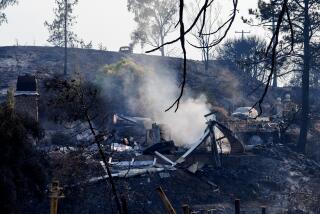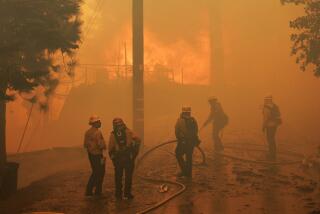NEWPORT BEACH : Harbor Patrol Offers Added Protection
Without the help of the Orange County Sheriff’s Harbor Patrol, the enormous fire that ripped through the Mariners Mile business strip along West Coast Highway in 1975 might have raged longer, destroying more businesses, local firefighters say.
It was water pumped directly out of Newport Harbor by the Harbor Patrol’s fireboats that finally doused the huge blaze, which left an entire block in charred ruins.
The stubborn fire, one of Newport Beach’s largest, taxed the area’s water supply. Harbor Patrol fireboats, which can pump 3,000 gallons a minute from the bay, were essential, according to fire officials. “We used a tremendous amount of water from them,” Deputy Fire Marshal Jim Upton said.
Firefighting is part of the Harbor Patrol’s long list of duties, which include enforcing marine and criminal laws and towing stranded boaters.
Five boats equipped with firefighting gear are stationed at the three county harbors in Newport, Huntington Beach and Dana Point. All Harbor Patrol deputies are trained to fight boat and structure fires. They handle oil, sewage and hazardous waste spills in the water, just like firefighters on land.
The Harbor Patrol responds to an average of only two or three fire calls a month in all three harbors. But when fires occur, deputies work closely with regular firefighters, battling structure fires from the water and helping firefighters and paramedics get to boat fires in the harbor and ocean.
Crowded conditions in the county’s harbors, where homes and boats can be densely packed, pose particular problems for firefighters, said Deputy Pat Fergus, a 21-year veteran of the Harbor Patrol. There are 9,000 boats docked in Newport Harbor alone.
“Everything is so closely set in here, if we catch one boat or house on fire, it could spread real quick,” Fergus said as he and partner Terry Lundy, a 22-year veteran, went about their daily patrol of Newport Harbor aboard one of the fireboats.
Gasoline inside boat tanks and at fueling docks is another fire threat. And fiberglass used in boat construction can be highly toxic when it burns, creating a health hazard for firefighters, Fergus said.
Recreational boaters aren’t typically prepared for fires, Fergus said. They are more vulnerable to burns because they wear minimal clothing such as shorts and bathing suits. In addition, they can forget that cigarettes and gasoline fumes can be a volatile mix, Fergus said.
All those factors add up to a stressful situation for deputies when a fire breaks out, Fergus said. “There’s no two ways about it. This is a . . . dirty, difficult job.”
More to Read
Sign up for Essential California
The most important California stories and recommendations in your inbox every morning.
You may occasionally receive promotional content from the Los Angeles Times.









